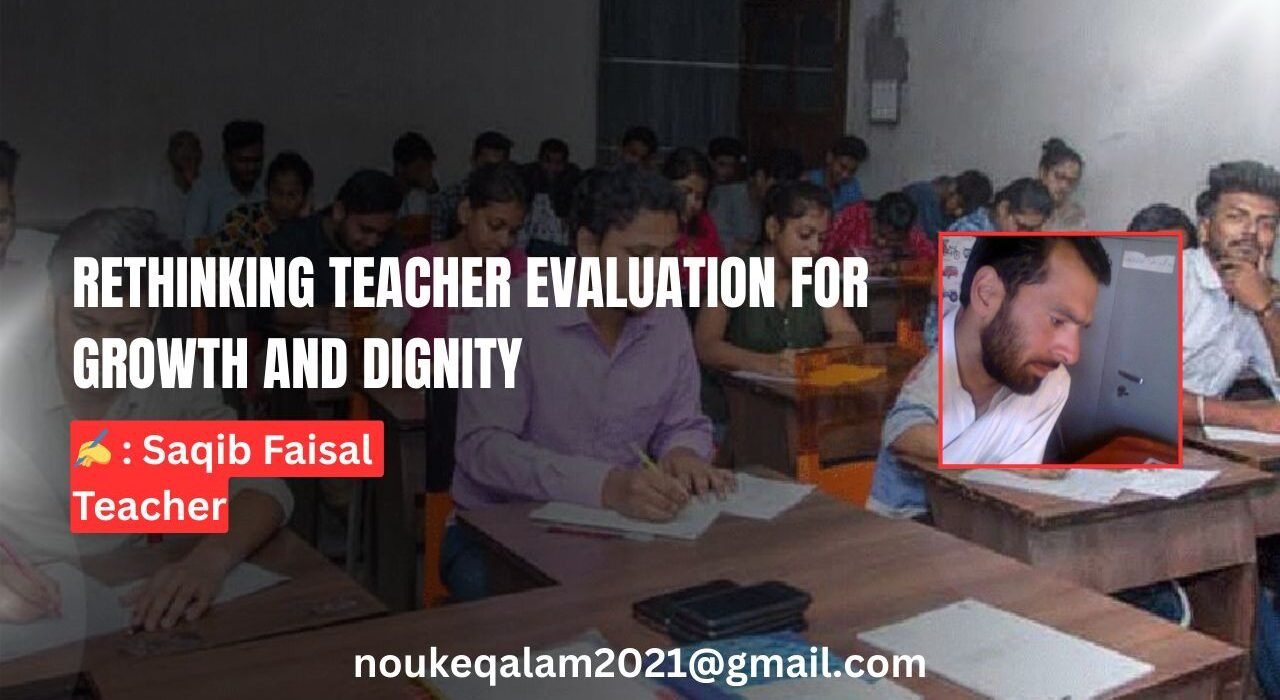✒️:. Saqib Faisal / Teacher
Teachers form the backbone of any education system, and their role in shaping the future of a nation is unmatched. It is, therefore, understandable that their competence should be periodically assessed to ensure quality education for students. However, such assessments must be fair, balanced, and constructive. The recent order of the Hon’ble Supreme Court to mandate Teacher Eligibility Test (TET) for all in-service teachers, with the grave possibility of termination for those who fail has triggered widespread concerns.
Most of the currently serving teachers were appointed after going through due procedures laid down by competent authorities of that time. These procedures included written tests, interviews, and verification of qualifications. To now subject the same teachers to another “eligibility” test that questions their very right to continue in service is, in effect, questioning the credibility of the authorities who engaged/appointed them in the first place. Such retrospective alterations in service conditions create insecurity, demoralisation, and a sense of injustice among teachers, who have already dedicated years of service to the system.
Assessment with a Purpose
Assessments are not inherently problematic. In fact, when designed properly, they serve as powerful tools to promote accountability, growth, and continuous improvement. The key lies in their purpose and application. Instead of using TET or similar tests as a threat to teachers’ livelihood, they should be applied in a constructive way—for career progression, promotions, and skill development.
A more rational approach would be to categorise teachers according to their levels of teaching—Primary, Elementary, Secondary, and Senior Secondary—and design level-appropriate evaluations for them. Such evaluations would reflect the specific knowledge and pedagogical skills required at each stage. For example, a primary school teacher’s assessment should focus more on foundational literacy and numeracy skills, while a senior secondary teacher should be tested for subject depth and advanced pedagogy. By linking these assessments to professional growth opportunities rather than job security, teachers would feel motivated rather than threatened.
Role-Specific Responsibilities
Another major concern in the current system is the lack of alignment between teachers’ strengths and the roles they are assigned. Schools and education departments require two equally vital categories of professionals:
- Academicians – those who excel in classroom teaching, subject expertise, and pedagogy.
- Administrators – those with aptitude in leadership, management, and organisational skills.
Unfortunately, promotions in the education sector are often based on seniority alone, without considering role suitability. This has led to glaring mismatches: exceptional teachers being pushed into administrative positions such as Headmasters, ZEOs, or Principals, where they struggle with management duties; and individuals with strong administrative acumen being placed as lecturers, where their leadership skills are underutilised. Both cases reduce efficiency and ultimately affect students.
Introducing role-specific assessments can resolve this issue. Teachers aspiring for administrative posts should undergo tests or training in leadership, communication, and organisational management, while those focused on academics should be evaluated for subject mastery and innovative teaching practices. Such a system would ensure that the right person is placed in the right role, maximising both job satisfaction and institutional efficiency.
Safeguarding Dignity and Enhancing Quality
At the heart of this debate lies the dignity of teachers. Policies that threaten their service security not only demotivate them but also diminish the respect society accords to the teaching profession. On the other hand, policies that promote growth, reward merit, and respect original recruitment guidelines will foster a culture of trust and accountability.
If evaluations are framed as opportunities for professional enrichment, teachers will embrace them wholeheartedly. Linking assessments to promotions, pay raises, and training opportunities will create healthy competition and inspire teachers to constantly upgrade themselves. Moreover, aligning administrative responsibilities with aptitude will ensure efficiency and prevent wastage of talent.
Conclusion
Education is too important to be left to policies that breed fear and insecurity. What is needed is a balanced framework—one that respects past recruitment processes, motivates teachers through constructive evaluations, and ensures role-specific placements. Such an approach will not only safeguard the dignity of teachers but also strengthen the accountability, effectiveness, and overall quality of the education system. In the end, empowered teachers mean empowered students, and empowered students mean a stronger nation.






Реферальный код на binance
September 20, 2025I don’t think the title of your article matches the content lol. Just kidding, mainly because I had some doubts after reading the article.